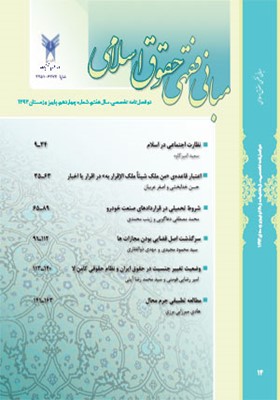اعتبار قاعدهی«من ملک شیئاً ملک الإقرار به» در اقرار یا اخبار
محورهای موضوعی : جامع الفقهیه
1 - دانش آموخته دکتری دانشگاه آزاد اسلامی، واحد علوم و تحقیقات، رشتهی فقه و حقوق اسلامی، تهران، ایران
2 - استادیار دانشگاه آزاد اسلامی، واحد علوم و تحقیقات، گروه فقه و حقوق اسلامی،
تهران، ایران
کلید واژه: اقرار, اخبار, من ملک, اقرار العقلاء, بنای عقلاء,
چکیده مقاله :
قاعده فقهی من ملک شیئاً ملک الإقرار به، از قواعد اصطیادی و مشهور نزد فقهای شیعه و اهل سنّت است. هرچند در کلام معصومین (ع) تصریحی به این قاعده نشده امّا فقهای بزرگی مانند: شیخ طوسی، ابن ادریس، ابن براج، محقّق، علامه، فخر المحققین و شهید اوّل به آن تمسک کرده و بر اساس آن فتوا دادهاند. بر اساس این قاعده، هر کس که قدرت تسلّط و تصرّف در یک شیء را داشته باشد، اختیار اقرارِ نسبت به آن را هم دارد. بنابراین، اقرار وکیل، نسبت به موکّل خود در اموری که اختیار انجام آن را دارد، اقرار صغیر، در اموری که مجاز به انجام دادن آنهاست، مانند وصیت به معروف و صدقه و نیز اقرار نمایندگانِ قانونی مثل حاکم، ولی و قیم، نسبت به مولی علیهم خود، نافذ خواهد بود و به حکم این قاعده اقرارشان مانند اقرار اصیل، اعتبار خواهد داشت و یا این که مؤدای این قاعده گاهی اخبار یا اعلام یا ادعاست و به معنی حقیقی اقرار نیست. برخی قائلند نسبت این قاعده با قاعده اقرار العقلاء، عامین من وجه در موارد و مصادیق است در عین حال بعضی با قبول چنین نسبتی در مصداق، قائل به تباین مفهومی با یکدیگرند. اما برخی دیگر رابطه این دو قاعده را عموم وخصوص مطلق عنوان نموده و قاعده اقرار را داخل در قاعده من ملک می پندارند و برخی از بزرگان مانند امام خمینی (ره) هردو قاعده را مساوی هم می دانند. از این قاعده، تعابیر مختلفی در لسان فقهاء شده است که معروفترین آنها، من ملک شیئا ملک الاقرار به میباشد. در قانونی مدنی ایران، مواد اقرار، بر اساس قاعده اقرار العقلاء تنظیم شده است؛ اما موادی هم بر مبنای این قاعده، وجود دارد. در هر حال مهمترین مستند اعتبار این قاعده، اجماع و بنای عقلاء است و در عین حال که مصادیق این قاعده با قاعده اقرار العقلاء، هم مورد اجتماع دارد و هم مورد افتراق مفهوم آن دو با هم متباین هستند.
Jurisprudential principle "whoever is owner of thing is also owner of confession of it" is a collected principle and famous among Shia and Sunni jurisprudents. Although the infallible Imams word specifying to this principle but not great jurisprudents like Shaykh Tusi, Ibn Idris, Ibn Barraj, mohaqeq, Allama, Fakhr Almohaqeqyn and shahid avval have appealed and based on that it has been fatwa. According to this rule, anyone who has power, domination and possession in the one thing, it also has the authority to admit towards it. Therefore, confess Attorney to his client in matters that have allowed to do it,Confession Minor, in matters that are allowed to perform, as will the famous and charity andalso acknowledge the legitimate representatives to dominate as governing, guardian or legal guardian, will be acceptedandthe sentence this law, acknowledging them as genuine confession, will be validor that the content of this rule may give notice or announced or claim is not the the true meaning of confession. Some of the rule of rule "eqrar al oqala" that, in the case of general and specific considered and some By taking this ratio in the cases, them with each other accepted conceptually divergence. But some other, general and specific rules Relationship these two absolute expression and rule "eqrar" within in the rule of " whoever is owner " considered and some scholars like Imam Khomeini, both equally well knows rule. Of this rule, different expressions from the jurisprudents of the most famous, «whoever is owner of thing is also owner of confession of it ». in the Iranian Civil Code, substances confession, based on rule "eqrar al oqala" has been set; but the some material based on this rule exists. Anyway, documenting The most important validity of this rule,consensusandconsensus and Concept of rational people is andwhile with the rule of law " eqrar al oqala ", both case society and also case differentiate the two concepts together in the their heterogeny.


